- Home
- Jeff Mariotte
The Burning Season Page 7
The Burning Season Read online
Page 7
“Makes sense, someone living in these woods for any length of time, it’d be easiest to get around on existing trails.”
They followed the path. There were faint impressions of boots in the dirt, filmed with ash, as everything was. “A lot of tracks,” Sara said. “Coming and going. They’ve used this for a while.”
“But that fabric scrap you found, that was new.”
“That hadn’t even burned.”
“So they were here after the fire started.”
“It sounds crazy, but I think so. Probably getting out in a hurry, not watching where they were going.”
“This trail keeps leading up, it’s going to lead right to that neighborhood,” Nick said. “Where the firefighters died.”
Sara looked at the hillside, checked the position of the sun through the brittle trees. “Yeah, I guess so.”
Although they thought they knew where the trail led, they followed it. Sara felt like a tracker of old, studying the landscape for faint signs, cracked twigs, and indentations in the earth. At one point she found a granola bar wrapper that the earlier inhabitants of this mountain region wouldn’t have come across. They had been at it for almost forty minutes when they heard scrambling from up the slope.
“Hello!” Nick called. “LVPD Crime Lab! Who’s up there?”
A muffled response drifted down to them. “Probably can’t hear you over all the noise they’re making,” Sara suggested. “You think it’s our campers?”
“Only one way to find out,” Nick said. “Let’s meet ’em halfway.”
Sara groaned, but mostly in fun. She loved being outside, was glad Catherine had assigned her this duty. The only drawback was that the forest was so trashed from the fire, and she preferred them vibrant, greens so pure and rich they made your eyes ache, buzzing with the sounds and smells of fertile life. She and Nick kept climbing, the trail growing progressively steeper and rockier as it cut uphill.
A few minutes later, she got her first look at the man coming down. “Nick,” she said in a loud whisper. “It’s just one guy.”
“I thought it was a platoon.”
The man looked accustomed to forest hiking. He wore jeans with huge black streaks up the legs, from ash and char. His shirt was long sleeved, light cotton, and his boots were serious outdoor gear. A sheen of sweat coated his face, darkening his shirt at the sides. He cradled a shotgun in his arms.
“Sir?” Nick called. “We’re with the Las Vegas Crime Lab. I’m going to ask you to put that shotgun down.”
“Why?”
“Just put it down!” Sara said, her voice commanding.
Nick’s hand drifted toward the service weapon at his belt.
“This is still America, isn’t it?”
“We’re only going to say it one more time,” Nick said. “Put down that weapon.”
“Fine,” the man said. He bent over and gently rested his shotgun in a bed of ash. “It’s going to be filthy.”
“Yes, sir, I’m sorry about that,” Nick said. “But we’re more comfortable talking to people who aren’t carrying firearms.”
“Have you found them?” the man asked. He was on the burly side, but not fat.
“Found who?” Sara asked.
“Those hippies who were camping down here.”
“Hippies?” Sara echoed.
“Whatever you call ’em these days. They had dirty long hair. Man and a woman, I think, but it was hard to tell.”
“We haven’t found the people who were camping below, if that’s what you mean. Why do you ask?”
“Because they started this fire.”
“They did?”
“I’m sure of it.”
In Sara’s experience, the more certain people were of things they could have no way of knowing, the less likely they usually were to be right. “We’d like to talk to them,” she said. “Their trail seems to lead this way. You don’t know where they might have gone?”
“I got no clue.”
“We’ve just come from their camp,” Nick said. “They’re completely burned out.”
“Serves ’em right.”
“Can we get your name, sir?” Sara asked. “Givens. Harley Givens.”
“Do you live around here?”
He jerked his head back up the hill. “On the road up there.”
“The evacuation order hasn’t been lifted, as far as I know,” Nick said.
“Well, nobody stopped me when I drove back in.”
“That was probably an oversight. I believe the fire is contained, but it might not be safe yet to go home.”
“What’s left of my home, you mean?”
“Was there a lot of damage?” Sara asked.
“It’s only about half gone.”
“We’re very sorry for your loss,” she said, aware that she was using phraseology ordinarily reserved for survivors of the recently deceased. The grief had to be similar, though, if not exactly comparable. One of the stages of grief was anger, and that seemed to be where Harley Givens was stuck.
“I’ll tell you what, sir,” Nick said. “We’re going to figure out who started this fire, and that person or persons will be punished. But having people tromping around the woods with guns is only going to make our job harder, and may obscure important evidence.”
“Can you tell us what you know about these campers?” Sara asked.
“Not much,” Givens said. “They have long hair, they’re dirty, they’re living in the woods like animals.”
“How long have they been there?”
“It’s been months. Five, six, maybe. I don’t know what they live on. I guess they go to town for groceries once in a while. Mostly I think they hunt, or eat nuts and berries or whatever they can scrounge out here. Sometimes they steal, too. Most of us pay a pretty penny to live on this hill, and here they are, squatting in the woods for free, leaving their waste around, scaring off the animals.”
“What makes you think they started the fire?” she asked.
“It just stands to reason. They had a campfire going every night.”
“Mr. Givens, we were just at their camp. It looks like they had a pretty well constructed fire ring. They’re in a wide clearing, no branches directly overhead.”
“Doesn’t take much of a breeze to pick up embers from a fire up here, carry ’em to the trees,” Givens countered. “It’s been so dry.”
“I understand that, Mr. Givens. But the Forest Service investigators believe the fire was started intentionally, and they have a good idea of where. And it was not at that campsite.”
“Yeah, they believe. But they don’t know, right?”
“Not for an absolute certainty, yet,” Nick admitted. “That’s one of the things we’ll be looking into.”
“They gotta pay,” Givens said. “You gotta find them and make them pay.”
“We’ll find the perpetrators, sir,” Sara assured him. “Why don’t you go back down the mountain until the evacuation order is lifted?”
“Guess I don’t really have much choice, do I?”
“No, sir,” Nick replied. “You really don’t.”
9
CATHERINE MET JIM Brass in a police department hallway. “Thanks for coming,” he said. “You examined the first scene and you were a witness at the second, so I thought you might be able to help with an interrogation.”
“Of who?”
“Guy’s name is Alec Watson.”
“I’ve heard of him.”
“You’re not alone. That’s just the way he likes it.”
“Is he involved in those protests at the DCN building?”
Brass stuffed his hands in his pockets and shrugged. “He’s one of the movers and shakers behind them. If there’s a right wing angle to be played, he plays it. I brought him in as a material witness, not as a suspect, so we’ll have to keep this friendly.”
“Understood,” Catherine said.
“Come on, then.” Brass opened the door to the interview room, and Catherine fo
llowed him in. Alec Watson was already sitting at the wooden table. A paper cup of coffee stood on the table, steam slipping from the plastic lid’s opening.
“How’s the joe?” Brass asked.
“It’s not home-brewed, but it’ll do,” Watson said. He was an athletic man, dressed in casual but expensive clothes. His long legs were stretched out under the table, and Catherine noticed that his shoes were barely scuffed on the bottoms. They probably hadn’t cost much more than an average squad car. He had short red hair, combed back off his face, sparkling blue eyes, and a smile that seemed at the same time genuine and apologetic, as if he were somehow inconveniencing them. Catherine wondered why some political pundits who weren’t nearly so attractive ended up on TV, while this one stayed behind the scenes, writing and publishing.
“Thanks for coming in, Mr. Watson,” Brass said. He scooted back a chair opposite Watson, waited for Catherine to sit beside him, then took his own seat. “I’m Captain Jim Brass, and this is Supervisor Catherine Willows of the Crime Lab.”
“Pleasure,” Watson said. He didn’t offer a hand, and neither did Catherine or Brass.
“I understood this would be a brief interview,” Watson said. “So I didn’t arrange for representation. If that was inaccurately described to me, I’d like to know now so I can call my lawyer. The hourly fees those sharks charge, you know.”
“We’ll try to keep it quick and informal,” Brass promised. “But if at any time you don’t want to go on without a lawyer, you certainly have the right to stop us until you can get one here. You’re not under arrest or under oath—we’re just looking for some information here.”
“I’ll do what I can.”
“We appreciate that. Mr. Watson, you know there’s been a bombing that seems to have been directed at Dennis Daniels. There’s also been a fire at the DCN headquarters.”
Watson studied Catherine through narrowed eyes, then pointed a long finger at her. “You’re the one who thinks we’re behind it.”
“I was misquoted,” Catherine said. “Taken out of context.”
“Happens all the time. My side likes to complain about the liberal media, but that’s really too facile a representation,” Watson said. “The truth is more that we have an incompetent media, incapable of presenting either side accurately, or of understanding what they’re getting wrong. They go to journalism school, when in fact the political reporters should be studying government, the science reporters science, and so on.”
“We don’t know who’s behind these attempts, Mr. Watson,” Brass said, pointedly ignoring the man’s digression. “All we know is that somebody is. We know multiple groups are involved in the protests, some conservative and some liberal. We also believe that some of those groups are more mainstream, and some are more fringe. The concern is that someone, possibly someone associated with one of those fringe groups, has gone freelance. Maybe they felt that carrying signs and chanting slogans wasn’t strong enough, and they wanted to put some real fear into Daniels. We can only guess at their motive—maybe trying to influence his channel’s coverage, or trying to prevent him from entering the race for governor.”
“That’s always a possibility,” Watson replied. “None of us can look into the heart of those around us, even those who agree with us on most of the fundamentals.”
“And it didn’t escape notice,” Brass continued, “that the first attack was with a bomb, and the name of your organization is BOOM.”
Watson shook his head. “Is this where I should demand a lawyer?”
“That’s entirely up to you,” Brass said.
“Seriously, BOOM stands for Because it’s Our Own Money. We’re opposed to excessive taxation, and in favor of revisiting the nation’s tax laws in a major way. But we’re not violent.”
“I didn’t say you were.”
“The name is actually a reference to the anarchists of the late nineteenth and early twentieth centuries,” Watson said. “The bomb throwers. Their methods and their ideologies were wrong, but they had one thing right. We could use a little more anarchy these days, a little less nanny government intruding upon the people’s lives and business.”
“I thought the anarchists were trying to disrupt the social system, but in favor of more regulation in certain areas,” Catherine said. “The labor movement, for example.”
“Worst thing that ever happened to the American worker,” Watson declared.
“Didn’t they bring us weekends, paid sick leave, the forty-hour week?”
Watson had clearly given plenty of thought to the topic, and he addressed it with a smooth, professorial air. “They came along just as the industrial revolution was making great strides. They made unreasonable demands of owners, who agreed to those demands because in the long run, it was to their benefit. Sure, they gave the workers weekends off. But the long-range impact of industrialization was to increase productivity, and therefore to increase profit. If those same workers had stayed loyal, they could have shared in the profits generated by streamlined manufacturing processes. They could have been owners, but instead they wanted to be removed from the whole process, to set strict limitations between a person’s job and the rest of his life. If they hadn’t done that, they could have been rich.”
“Those who didn’t lose their jobs to machines,” Brass countered. “And if everybody was a millionaire, then the rich would have to be billionaires. I went to Italy for a law enforcement conference a few years ago, and I had a million lira in my pocket. But a decent dinner cost a hundred thousand lira.”
“The point is,” Watson went on, “the labor movement steered the workers wrong. The owners were trying to do the right thing, trying to keep people employed while the industrial revolution took hold. And those anarchists throwing bombs just got in the way. The people lost their chance, in those days, to be the ones who ran the world. I don’t want them to miss out this time. So we could use some of that anarchic spirit, the idea that it’s the people, not the powerful, who run things. That’s the philosophy behind BOOM. It’s not about literal bombs, it’s about metaphorical ones—shaking things up, challenging the entrenched interests in Washington. The best way to do that is through tax policy. If we strangle the government economically, it’ll have to listen to us.”
“If we strangle the government economically, who pays for schools and roads? And police?” Catherine asked.
“There will always be money for the critical things,” Watson assured her. “It’s everything else that should be looked at carefully, with the understanding that every dollar spent came from the people. That’s not so radical, is it?”
“Refresh my memory, Mr. Watson,” Brass said. Catherine recognized his usual technique of changing the subject when an interviewee got carried away with his own words. “You run this activist group, but your main business is publishing, right?”
“I started out as a journalist,” Watson said. “But I was never that good at it. Real journalism, in my mind, requires an objectivity that I couldn’t bring. I was too damn opinionated for my own good. So I decided to become a pundit. After doing that for a while, I realized I was nothing but a hired gun, and I could make a lot more money working for myself. So I started my magazine, Elementary—as in ‘Elementary, my dear Watson,’ and things just took on a life of their own. Now there’s the magazine, the book line, the online presence, dozens of bloggers, and so on.”
“So you went from writer to mogul.”
“That’s as good a summary as any.”
“And you basically precipitated these demonstrations against your fellow mogul, Dennis Daniels.”
Watson chuckled. “I’d like to think there was some equivalency, but the truth is the TV business will always generate far more profit than publishing. My website does okay, but it’s no internet behemoth. As for precipitating demonstrations, he did that himself, by consistently using his air to push for programs that will have the effect of raising taxes. In case anybody hasn’t noticed, we’re struggling with a weak
economy and high unemployment, and these are likely to be with us for some time. The last thing anybody needs right now is an increased tax burden.”
“Right,” Brass said. “But he’s not a politician, at least not yet. He’s promoting an agenda, but he’s not casting votes. And he didn’t put out a message saying, ‘come picket my office.’ You did that, mostly through your online efforts.”
Watson considered the comment before he nodded. Catherine guessed he was once again thinking about lawyering up. “That’s accurate. And you’re right that he isn’t an elected official. But his actions can provide cover for elected officials who are directly casting votes for increased taxes.”
“Did you think it would get as big as it has? Or last as long?”
“I really had no idea. I hoped we could turn out people for a weekend. The fact that they’ve been out there for three weeks is quite a surprise.”
“Do you know most of the players?”
“Many of them, but certainly not all. There are groups represented there that I’ve never heard of, and others I know of but have never had any contact with. And of course some individuals who aren’t connected to any group at all. There’s even a liberal organization protesting the use of tax dollars for what they call the never-ending war.”
“Speaking of war, you have war veterans in your group, don’t you?” Brass asked.
“Of course. But I advise you to choose your next words carefully, Captain Brass. To accuse America’s fighting men and women—”
“I’m not making any accusations. Given the nature of the bomb, though, it would be irresponsible to not ask the question.”
“I understand that. I’m telling you, the people who represent BOOM in that demonstration are not violent people. I don’t know every individual across the country who has joined online, but there’s nothing in our policy positions, or in our collected writings, that would suggest to anyone that murder or violence are acceptable political acts.”
“That’s BOOM. What about the other organizations involved? And the people you mentioned who aren’t affiliated? Has there been anyone all along who might have struck you as unbalanced in that way?”

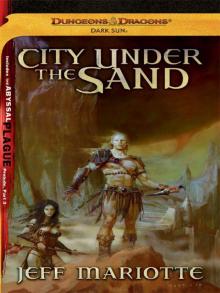 City Under the Sand
City Under the Sand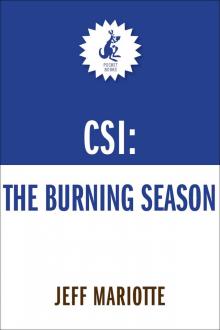 The Burning Season
The Burning Season Sanctuary
Sanctuary Winds of the Wild Sea
Winds of the Wild Sea Serpents in the Garden
Serpents in the Garden Close to the Ground
Close to the Ground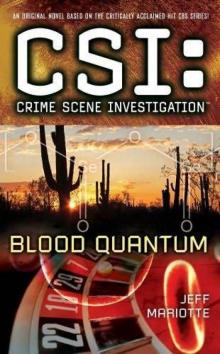 Blood Quantum
Blood Quantum Brass in Pocket
Brass in Pocket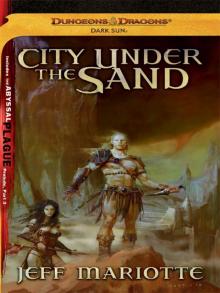 City Under the Sand: A Dark Sun Novel (Dungeons & Dragons: Dark Sun)
City Under the Sand: A Dark Sun Novel (Dungeons & Dragons: Dark Sun)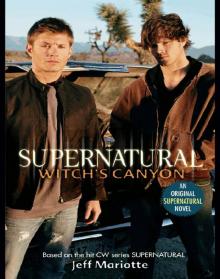 Witch's Canyon
Witch's Canyon STAR TREK: The Lost Era - 2355-2357 - Deny Thy Father
STAR TREK: The Lost Era - 2355-2357 - Deny Thy Father Dawn of the Ice Bear
Dawn of the Ice Bear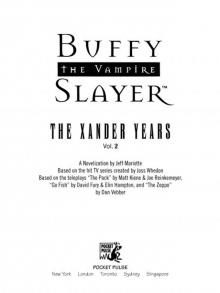 The Xander Years, Vol.2
The Xander Years, Vol.2 Ghost of the Wall
Ghost of the Wall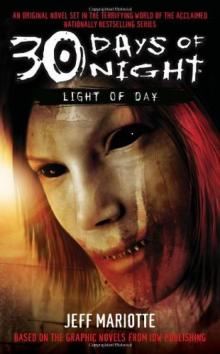 30 Days of Night: Light of Day
30 Days of Night: Light of Day Deny Thy Father
Deny Thy Father Criminal Minds
Criminal Minds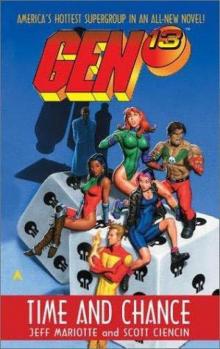 Time and Chance
Time and Chance The Folded World
The Folded World Bolthole
Bolthole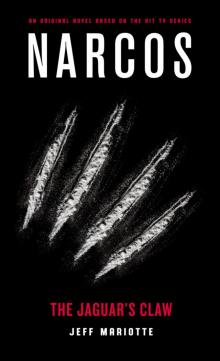 Narcos
Narcos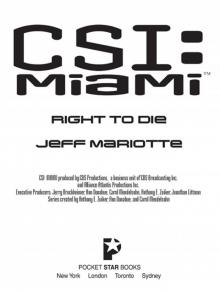 Right to Die
Right to Die